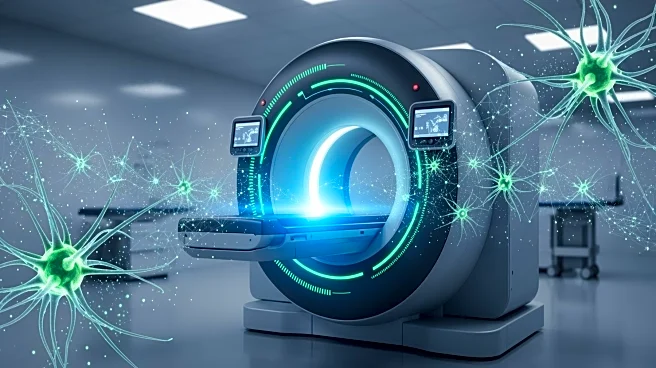What's Happening?
The AI in healthcare market is anticipated to grow significantly, reaching USD 701.79 billion by 2034, up from USD 37.09 billion in 2025. This growth is driven by advancements in machine learning technologies,
which are enhancing the effectiveness of medical care. Machine learning holds a substantial market share of over 36% as of 2024, due to its ability to transform patient outcomes, improve care quality, and streamline healthcare delivery. The technology is pivotal in automating administrative tasks, optimizing resource allocation, and enhancing workflow management, which collectively contribute to better patient care efficacy. Notable developments include InterSystems' launch of HealthShare AI Assistant, aimed at improving access to patient information for clinicians and administrators.
Why It's Important?
The expansion of AI in healthcare signifies a transformative shift in medical practices, offering precision and speed in diagnosis and treatment plans. This growth is expected to reduce healthcare costs and improve patient outcomes by enabling early identification and efficient therapy plans. The widespread adoption of AI technologies in healthcare can lead to significant savings for healthcare organizations and make healthcare more accessible and affordable. Stakeholders such as healthcare providers, technology companies, and patients stand to benefit from these advancements, as they promise enhanced operational efficiency and improved patient care.
What's Next?
As AI technologies continue to evolve, healthcare systems may need to adapt to these innovations to fully leverage their potential. The partnership between Danaher Corporation and AstraZeneca to develop diagnostic tools exemplifies the ongoing efforts to integrate AI into precision medicine. Future developments may focus on personalized treatment plans, improved population health management, and virtual health assistants. The healthcare industry is likely to see increased collaboration between tech companies and medical institutions to further advance AI applications.
Beyond the Headlines
The integration of AI in healthcare raises ethical and legal considerations, particularly concerning data privacy and the accuracy of AI-driven diagnostics. As AI becomes more prevalent, healthcare providers must address these concerns to maintain patient trust and ensure compliance with regulations. Additionally, the shift towards AI-driven healthcare may require changes in medical education and training to equip healthcare professionals with the necessary skills to work alongside AI technologies.









